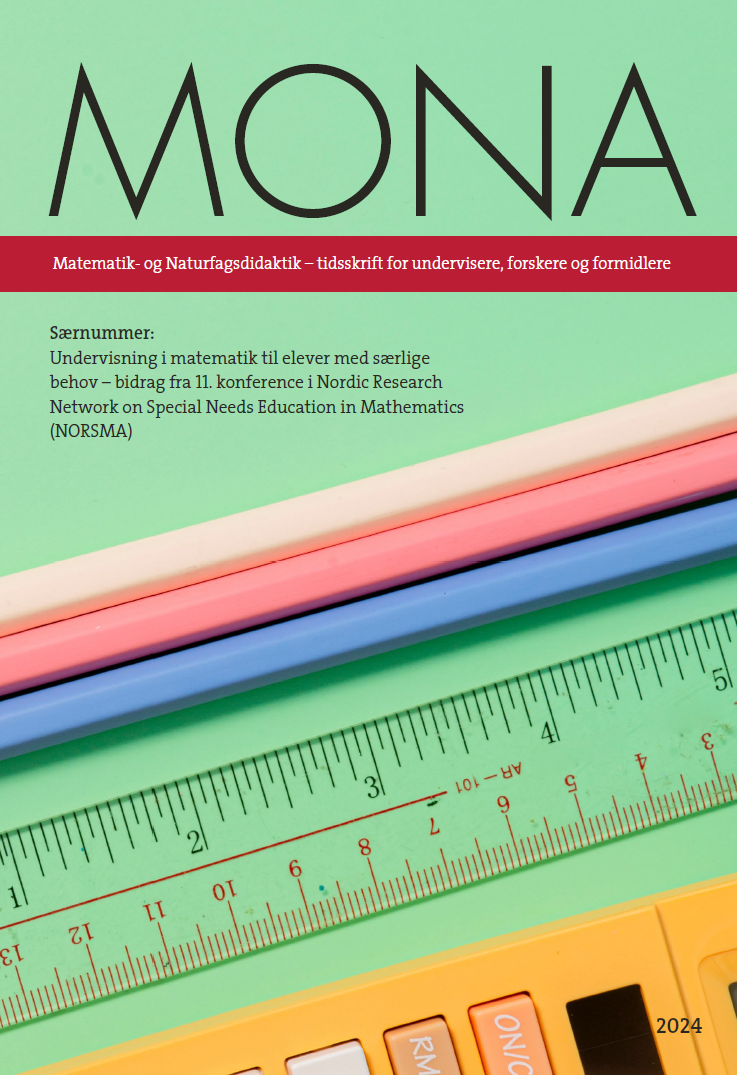Resumé
Abstract: The purpose of this educational action research was to understand how we can restructure
the course Mathematics for All, a graduate-level course taught at the University of Iceland. Data was
gathered and analysed thematically and cyclically with an open questionnaire at the end of the course
and individual interviews a year later. Findings show that the course influenced participants’ understanding
of mathematics education and their professionalism. The interviewed participants were able
to utilise problem solving and discussions in their classroom but faced challenges and needed ongoing
support to implement their learnings in class.
Referencer
Ainscow, M. (2020). Inclusion and equity in education: Making sense of global challenges. Prospects, 49, 123‑134. https://doi.org/10.1007/s11125‑020‑09506-w
Boaler, J. (2016). Mathematical mindsets: Unleashing students’ potential through creative math, inspiring messages and innovative teaching. Jossey-Bass.
Baumfield, V., Hall, E. & Wall, K. (2013). Action research in education: Learning through practitioner enquiry. SAGE. https://doi.org/10.4135/9781526402240
Cochran-Smith, M. (2005). Teacher educators as researchers: Multiple perspectives. Teaching and teacher education, 21(2), 219‑225. https://doi.org/10.1016/j.tate.2004.12.003 Compulsory School Act No. 91/2008. https://www.government.is/media/menntamalaraduneyti-media/media/frettatengt2016/91_2008-Compulsory-School-Act-ENGLISH-Uppfaert-Jan-2017.pdf
Guðjónsdóttir, H. & Kristinsdóttir, J. V. (2006). Teaching all children mathematics: How selfstudy made a difference. In D. Tidwell & L. Fitzgerald (eds.), Self-study and diversity, (pp.195‑212). Brill.
Guðjónsdóttir, H. & Kristinsdóttir, J. V. (2011). Team-teaching about mathematics for all: Collaborative self-study. In S. Schuck & P. Pereira (eds.), What counts in teaching mathematics, Self-study of teaching and teacher education practices, (pp. 29‑43). Springer. https://doi.org/10.1007/978‑94‑007‑0461‑9_3
Guðjónsdóttir, H., Kristinsdóttir, J. V. & Óskarsdóttir, E. (2009). Mathematics for all: Working with teachers. In K. Linnanmäki & L. Gustafsson (eds.), Different learners – different math? (pp. 273‑284). Proceedings of the 4th Nordic Research Conference of Special Needs Education in Mathematics.
Kasemi, E. & Hintz, A. (2014). Intentional talk: How to structure and lead productive mathematical discussions. Stenhouse Publishers.
Lindenskov, L. & Lindhardt, B. (2020). Exploring approaches for inclusive mathematics teaching in Danish public schools. Mathematics Education Research Journal, 32, 57‑75. https://doi.org/10.1007/s13394‑019‑00303-z
Lisenbee, P. S., & Tan, P. (2019). Mentoring novice teachers to advance inclusive mathematics education. International Journal of Whole Schooling, 15(1), 1‑27.
Luria, S., Sriraman, B., & Kaufman, J. (2017). Enhancing equity in the classroom by teaching for mathematical creativity, ZDM, 49(7), 1033‑1039. https://doi.org/10.1007/s11858‑017‑0892‑2
McNiff, J. (2013). Action research: Principles and practice. Routledge. https://doi.org/10.4324/9780203112755
Ministry of Education, Science and Culture. (2014). The Icelandic national curriculum, guide for compulsory schools – with subject areas. https://www.government.is/library/01-Ministries/Ministry-of-Education/Curriculum/adalnrsk_greinask_ens_2014.pdf
Moore, J. (2005). Transformative mathematics pedagogy: From theory to practice, research, and beyond. In A. J. Rodriguez & R. S. Kitchen (eds.), Preparing mathematics and science teachers for diverse classrooms. Lawrence Erlbaum.
Óskarsdóttir, E. & Guðjónsdóttir, H. (2004). How are special education teachers prepared to teach mathematics? In A. Engström (editor), Democracy and participation: A challenge for special needs education in mathematics (pp. 239‑248). Conference proceedings from NORSMA 2 in Örebro, October 2003.
Roos, H. (2019). The meaning(s) of inclusion in mathematics in student talk: Inclusion as a topic when students talk about learning and teaching in mathematics. (unpublished PhD dissertation) Linnaeus University Press. https://urn.kb.se/resolve?urn=urn:nbn:se:lnu:diva-82397
Roos, H. (2023). Students’ voices of inclusion in mathematics education. Education Studies Math 113, 229‑249. https://doi.org/10.1007/s10649‑023‑10213‑4
Scherer, P., Beswick, K., DeBlois, L., Healy, L., & Opitz, E. M. (2016). Assistance of students with mathematical learning difficulties: How can research support practice? ZDM 48, 633‑649. https://doi.org/10.1007/s11858‑016‑0800‑1
Scherer, Petra, and Jennifer Bertram. (2024). Professionalisation for inclusive mathematics—teacher education programs and changes in pre-service teachers’ beliefs and self-efficacy. ZDM – Mathematics Education. https://doi.org/10.1007/s11858‑024‑01580‑0.
Siðareglur háskólanna um vísindarannsóknir. (2020). [Ethics guidelines for universities for scientific research] https://www.hi.is/sites/default/files/ame18/reglur_sidanefnd_hv_5_nov_2020.pdf
Tan, P., & Thorius, K. K. (2018). En/countering inclusive mathematics education: A case of professional learning. Mathematics Teacher Educator, 6(2), 52‑67. https://doi.org/10.5951/mathteaceduc. 6.2.0052
Valero, P., Meaney, T., Alrø, H., Fairhall, U., Skovsmose, O. & Trinick, T. (2008). School mathematical discourse in a learning landscape: Understanding mathematics education in multicultural settings. Nordic Studies in Mathematics Education, 13(4), 69‑94.
Yeh, C., Ellis, M. W., & Hurtado, C. K. (2017). Reimagining the mathematics classroom: Creating and sustaining productive learning environments, K-Grade 6. NCTM

